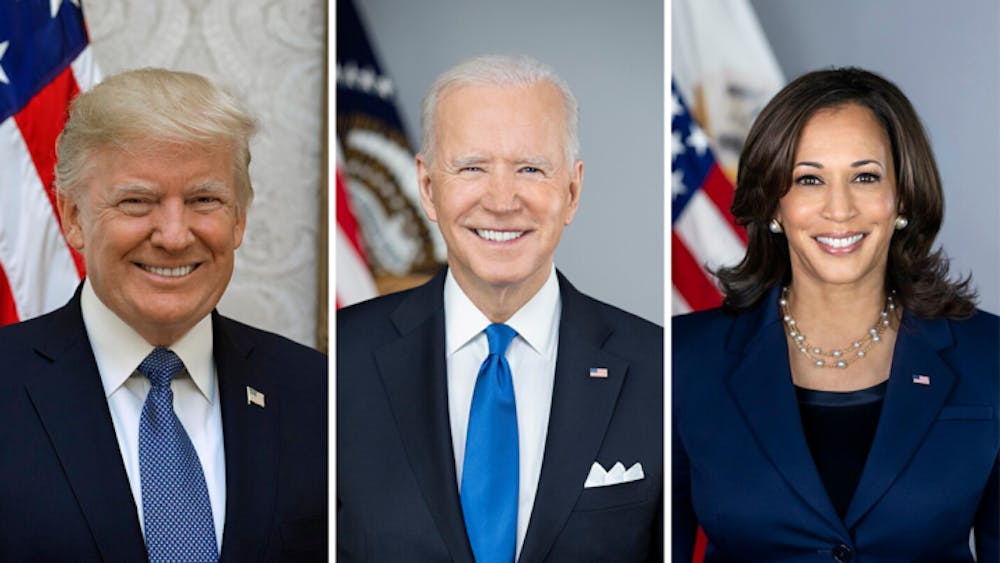Emory University political science professors used similar adjectives to describe the events of the 2024 presidential election: historical, unprecedented, tumultuous. This follows a summer defined by political commotion unseen in recent decades, with Associate Professor of Political Science Zachary Peskowitz noting that this campaign season has been marked by “major news.”
The Emory Wheel sat down with these professors to discuss the recent events of the presidential election and what U.S. voters can expect as they look toward Election Day.
July 13: Trump shot at rally
On July 13, during a rally in Butler, Pa., 20-year-old Thomas Crooks opened fire on Trump with an AR-15-style rifle, marking the first assassination attempt on a presidential candidate in 56 years. One shot grazed Trump’s right ear while another bullet killed volunteer firefighter Corey Comperatore as he shielded his family from the gunfire.
World leaders and U.S. politicians from both parties condemned the violence. In an Oval Office address, Biden acknowledged that American politics had become “very heated” and urged Americans to “cool” down the rhetoric. However, Biden noted that in American democracy, “disagreement is inevitable.”
Peskowitz believes the assassination attempt did not fundamentally change the trajectory of the race but noted that the attempt humanized Trump, as the event was “very close to a national crisis.”
Likewise, Associate Professor of Political Science Bernard Fraga commented on the “somewhat unprecedented” nature and severity of Trump’s assassination attempt. He added that the shooting received relatively less media attention compared to previous presidential assassination attempts.
“It’s somewhat surprising that this has been getting attention but not quite the level of attention … that you would think would be merited, given how grave the situation was and how much more severe it could have been,” Fraga said.
Fraga noted that the public viewed the attempt as “just another kind of event” in the campaign season rather than a crisis that elicits “a national conversation about political violence.”
July 15: Trump announces Vance as running mate
Two days after the assassination attempt and right before the Republican National Convention commenced on the evening of July 15, Trump named Sen. J.D. Vance (R-Ohio) as his running mate on his social media platform, Truth Social. Ohioans elected Vance to the U.S. Senate in 2022 after his memoir “Hillbilly Elegy” became a bestselling sensation in 2016.
Previously, Vance criticized Trump before becoming his running mate, calling him a “moral disaster.” Fraga thought it was “interesting” that Vance has limited political experience compared to former Vice President Mike Pence, suggesting it might indicate Trump’s confidence in handling things himself.
However, Associate Professor of Political Science Andra Gillespie said Trump likely picked Vance as his vice presidential candidate to continue the Make America Great Again (MAGA) legacy for the future and appeal to Rust Belt voters.
“J.D. Vance has the potential to be the face of the MAGA movement after Trump has receded from public prominence,” Gillespie said. “This was an opportunity for Trump, basically, to try to tap the next generation and to bring them along in this particular choice by picking somebody from the Rust Belt. He’s trying to shore up working-class white voters by picking somebody who’s from the region.”
July 21: Biden drops out
One week later, Biden took over the news cycle when he announced his withdrawal from the presidential race in a July 21 Instagram post, a decision that Peskowitz called an “extraordinary historical event.” However, the news did not “entirely” surprise Peskowitz.
The president’s decision followed weeks of uncertainty from Democratic leaders and voters about the president’s mental capacity and ability to lead for another four years. Calls for him to step down intensified after his performance at the first presidential debate, held by CNN on June 27 at the Techwood Turner Broadcasting campus in Atlanta. The debate drew criticism from the editorial boards of The New York Times and The Atlanta Journal-Constitution, along with several Democratic lawmakers, who urged Biden to step aside due to his shaky performance. Biden struggled to enunciate and had trouble answering questions clearly, according to Fraga.
However, before July 21, Biden had insisted he would not step down as the Democratic candidate, saying in an interview with ABC’s George Stephanopoulos that only “the Lord Almighty” could convince him to do so. His refusal came despite polling data that reflected voters’ concerns about 81-year-old Biden and 78-year-old Trump’s ages.
Initially after the debate, Gillespie noted that the probability of a Democratic candidate switch is “higher than zero” and predicted an open convention if Biden exited early.
July 21: Harris announces candidacy
After announcing his withdrawal from the race, Biden endorsed Vice President Kamala Harris as the next Democratic candidate. She announced her intent to run for president that same day, stating her hopes to “unite the Democratic Party” and the nation.
Democratic National Committee Chair Jaime Harrison announced on Aug. 2 that Harris, who raised $81 million in the first 24 hours after announcing her candidacy, secured enough votes to be the Democratic party’s presidential nominee.. While Peskowitz believes that the Harris campaign will appeal to moderate and swing voters, Fraga said that Harris is “generating significantly greater enthusiasm from Black Democrats and younger Democrats.” Currently, polls indicate that Trump has a slight lead over Harris in Georgia.
On July 30, Harris held a rally with almost 10,000 attendees in Atlanta. Democrats at the event said they felt “a sense of renewed hope” and saw people “energized.” Peskowitz regarded the rally as “very successful.”
“[It] definitely increases the chances for the Democrats to carry Georgia, to have Harris at the top of the ticket, but it is an uphill climb,” Peskowitz said.
Aug. 6: Harris announces Walz as running mate
After vetting potential vice presidential candidates such as Pennsylvania Gov. Josh Shapiro and Sen. Mark Kelly (D-Ariz.) for three weeks, Harris announced Minnesota Gov. Tim Walz as her running mate on Aug. 6. Walz, who has been the governor of Minnesota since 2018, has pushed for progressive policies which include free school meals, abortion access and voting rights for ex-felons.
Peskowitz believes Harris’ selection is a “safe bet” and “broadly satisfactory.” However, while Peskowitz said Harris is campaigning “intensely” in Georgia, he does not see Walz appealing particularly to voters in the state.
“It’s a big play for moderate voters,” Peskowitz said. “It definitely is a play for Midwestern voters, and I think the Harris campaign is counting on Walz being appealing amongst … similar voters in Wisconsin, Michigan and Pennsylvania, to some extent.”
Looking forward
Before Biden dropped out, ABC News planned to host the next presidential debate between the current president and Trump on Sept. 10. Trump initially suggested that he did not want ABC News to host the debate but agreed on Aug. 8 to debate Harris, who previously agreed to participate in the faceoff. A senior Trump adviser confirmed that Trump plans to debate Harris on Sept. 4 with Fox News, Sept. 10 with ABC and Sept. 25 with NBC.
“Harris will certainly want to debate and shake up the race, whereas Trump might not want to reach an agreement and prevent her from standing on a debate stage with him,” Peskowitz said.
Additionally, the Democratic National Convention will begin on Aug. 19 in Chicago.
“It’s especially important, given the fact that Vice President Harris is a new candidate, that she’d have an opportunity to have a platform to really be able to talk directly to the American people,” Gillespie said.

Clement Lee (he/him) (24Ox, 26B) is majoring in Business with area depths in Information Systems and Operations Management and Business Analytics. He is originally from Strasbourg, France, but now resides in Virginia Beach, Virginia. Outside the Wheel, Clement enjoys watching movies, running long distances and playing golf. You can find him leisurely reading Marcel Proust's, "In Search of Lost Time" on the Quad.

Lauren Yee (she/her) (24Ox, 27C) is a managing editor at The Emory Wheel. She is from Hong Kong, majoring in religion and minoring in German. Outside of the Wheel, Yee is the president of the Hong Kong Student Association and the managing editor for In Via, Emory's Christian thought journal. In her free time, you can find her playing the saxophone, watching musicals, listening to Taylor Swift or enjoying an iced oat milk coffee!






